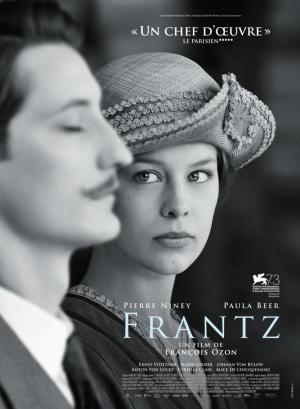Frantz

FRANTZ
It is 1919, in Quedlinburg, a town in Saxony, shortly after the end of the First World War. Anna brings flowers to the cemetery, to the grave of Frantz her fiancé, who died in the war, at the age of 24. Frantz's parents have asked Anna to live with them and share the pain of loss together. A young man also appears to bring flowers to Frantz. Then he shows up at the house to tell that he is a French friend of Frantz's.
The wounds of war and enmity between Germans and French frame this meeting. “This morning we discovered a sea of corpses. French, Germans? How do you know? At school, French children learn German and Germans learn French. And when they grow up, they kill each other, "says a letter from Frantz to his parents. However, Adrien's memories of the days in Paris with Frantz, before going into combat, bring a novel joy to the Hoffmeister home. Memories in vivid colors - inside a black and white film - with violin notes, a painting by Manet, and Paul Verlaine's autumn song: “The long sobs of autumn violins hurt my heart.
I remember days gone by, and I cry, and I leave… ”. Are all those memories true? What was the meeting between Frantz and Adrien really like?
To get to this point, the director, Francois Ozon, has been sewing for a hour a very delicate and beautiful lace; a seam to heal sadness, memories, divisions, recriminations, that the war has left. But then comes Adrien's confession to Anna of what really happened. The lace is torn. Only a hand as prodigious as that of Ozon can achieve the original and sentimental creation that the second part of the story brings. All the narrative elements from before will then be a piece full of meanings: the letters, the poem, the lake, hope and love, memories and farewells, guilt and forgiveness. With all of them, Anna makes the decision to go to Paris to find Adrien. What follows, the viewer will discover it little by little.
Francois Ozon (Paris, 1967) is a great narrator, with a fine treatment of the mysterious game of identities in his leading characters, such as In the house (2012), Young and pretty (2013), A new friend (2014), The lover double (2017), Thank God (2018). For Frantz (from 2016), the director does his version of a classic of the great Ernst Lubitsch: Broken Lullaby (Repentance) of 1932. As in this original, the French filmmaker takes us on the difficult path of reconciliation, forgiveness, peace, between people and peoples who see themselves as enemies (then but also today among us). And there is also the labyrinth of feelings and sensations that do not find their place, that cheer and depress equally, that are supported with pain and loneliness, that lead to appear, especially in the protagonists, Anna and Adrien. Newcomer Paula Beer and notable young actor Pierre Niney make this tormented labyrinth their own, with such authenticity and contentment that they avoid falling into easy sentimentality.
Ozon offers us an elegant and fine narration, woven very slowly, so that viewers can like it internally. We too are being invaded by sadness, loss, pain, remorse, lies, the desire to love ... How to overcome pain? When to tell or silence the truth? How to take the blame? How to give and receive forgiveness?
In his last letter before dying in the war, Frantz writes to his girlfriend Anna: "Promise me that you will keep wanting to live and be happy." A promise that always seems uphill. But the trip to France, the music, the letters, the countryside, and the painting by Manet at the Louvre, will finally unite the threads of this beautiful lace. And we too will resume our desire to live.
Luis García Orso, SJ
Mexico, April 24, 2020






